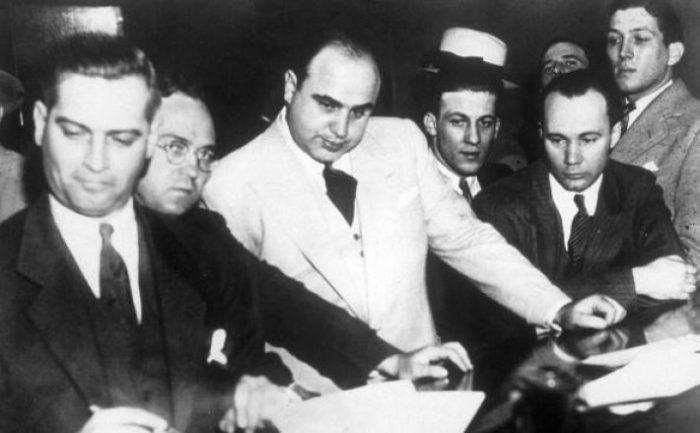Published in the Nikkei Asian Review 5/6/2015
So it’s a red card for Sepp Blatter, maximum leader of FIFA, the governing body of world football. Just days after winning a fifth consecutive term in a bizarre North Korea-style election, he has resigned, citing a “lack of support in the world of football” – which must be one of the understatements of the century.
The story started last week with a swoop worthy of Eliot Ness, the heroic investigator who took down Chicago gangster Al “Scarface” Capone. Swiss police, acting on behalf of the American FBI, mounted a dawn raid on the five star Hotel Baur Au Lac in Zurich with warrants for ten top officials of FIFA. The men were led out with sheets over their heads to face charges of “racketeering, wire fraud and money-laundering conspiracies” relating to two decades of kickbacks and bribes.
Allegations of dodgy dealing at FIFA come as no surprise. The hosting of the quadrennial World Cup is a multi-billion dollar enterprise, with huge cash-flows generated by sponsorship deals and the sale of broadcasting rights. All this is directed by a supra-national organization based in Switzerland, where accepting bribes was perfectly fine until the late 1990s and bank secrecy was the law of the land until 2013.
In such an environment accountability and transparency were about as likely as a World Cup win by the Cayman Islands, home of a FIFA vice-president now under arrest.
The final straw was the award of the 2022 world cup to Qatar, a country with summer temperatures of 50 Centigrade and such a weak football tradition that fans have to be paid to show up at games. According to The Guardian newspaper, the primarily Nepalese guest-workers tasked with building the stadium have been dying at the rate of one every two days in conditions that “amount to modern-day slavery as defined by the International Labor Organization.”
The FIFA saga reveals much about how the contemporary world works. It also takes us back to the age-old question articulated by Roman poet Juvenal – quis custodiet ipsos custodes, meaning “who will guard the guards themselves.”
In modern democratic societies the answer is that oversight is exercised by institutions such as elected parliaments, an independent judiciary, the press and civil society. They are by no means perfect and their verdicts are not unanimously accepted, hence the contention to which such societies are prone. Nonetheless, better alternatives have yet to be devised.
Globalization has removed power from nation states in general and at the same time driven a momentous rebalancing of economic power away from the small proportion of the world’s population that inhabits the Western countries where such institutions originated.
Sepp Blatter and his merry men were geniuses at riding this wave of geopolitical change.
“CHAMPION OF THE DEVELOPING WORLD”
In the words of writer Ian Buruma, “Blatter is a ruthless operator who presents himself as the champion of the developing world, protecting the interests of Africans, Asian, Arabs and South Americans against the arrogant West.” When the UK’s Sunday Times published an investigation into Qatar’s world cup bid, Blatter accused it of “discrimination and racism.” Predictably he was on excellent terms with President Putin of Russia, who praised Blatter for “professionalism and high authority” just days before his resignation.
Behind FIFA stand the amoral globalized corporations who pay vast sums for sponsorship deals and broadcasting rights in order to access the booming new markets of the developing world. Such entities have to be shamed into observing minimal labour and environmental standards and are highly creative in manufacturing optimal tax-avoidance schemes. It would be naïve to expect them to enforce good behaviour on FIFA, which is just an extreme example of a globalized entity with no proper governance.
Not coincidentally, FIFA structured itself as a bogus democracy in which tiny countries with no football culture have the same voting rights as giants of the game such as Brazil, Germany and Argentina. Any meaningful clean-up of FIFA must reject this pseudo-egalitarianism in favour of the principle of proportionality – those who make the largest contribution to football, in all senses, must have the largest voice. If this advantages European and Latin American countries at the expense of minnows from the developing world, then so be it. Even the UN, which has its own structural flaws, accepts that a linkage between contribution and voice is essential.
For an example of a supra-national institution that has acquired a good reputation for integrity and has generally done a fine job, look no further than the Asian Development Bank. The ADB has a clean reputation because the two most important members, Japan and the United States, are relatively clean themselves – ranking 15th and 17th respectively out of the 175 countries in Transparency International’s Corruption Perceptions Index.
More to the point, votes are distributed in proportion to capital subscriptions. The providers of the funds are in control, not those attempting to get their hands on them, as with FIFA. Yes, the ADB has been under Japanese leadership for its entire life, but the shareholding structure is diffuse, with Japan and the United States accounting for just 30% of the total. Crucially both are open societies where malfeasance can be uncovered and brought to account.
There is nothing culturally specific about corruption. It can happen anywhere if proper safeguards are not in place, as FIFA has just proven. Perhaps one day there may be a global version of Eliot Ness and his “Untouchables”, so called because of their granite-hard incorruptibility. Until then we can only rely on the best practice of nation states being extended to the governance of supra-national institutions, under the scrutiny of a rumbustious media.
It is in nobody’s interest to see what FIFA did to “the beautiful game”, as the great Pele called football, being repeated elsewhere.
